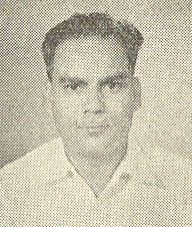D.V. Rao
Devulapalli Venkateswara Rao (1917-1984) was an Indian politician.

D.V. Rao was born in Ingurthi village, Warangal District on June 1, 1917, son of Devulapalli Varada Rao.[1][2] His family hailed from Bandameedi Chandupatla village, Suryapet taluk, Nalgonda District.[1]
Whilst a high school student in Khammam he took part in the 3rd conference of the Andhra Mahasabha.[1] D.V. Rao was active in the students movement, organizing protests against the Nizam of Hyderabad government.[2] Whilst a B.A. student at Osmania University, he was an organiser of the 'Vande Mataram' students movement in Hyderabad State.[1][2] He was expelled from university for his role in the protests, but was able to complete his graduation at Jabalpur Arts College in 1938.[1] He came into contact with Marxist literature during this period.[1] After having returned to his village, he married Ranganayakamma in May 1939.[1][2]
D.V. Rao was recruited by the Communist Party of India in 1939.[1] D.V. Rao would serve as President of the Nalgonda District Committee of the Andhra Mahasabha, and would go on to serve as secretary of the organization.[2] He was a key organiser of the Telangana armed struggle and spent eight years in the underground (until 1953).[2] He played an active part in the drafting of the 1948 Andhra Thesis of the Provincial Secretariat of CPI, which for the first time in India outlined a revolutionary line inspired by the experiences of the Communist Party of China under Mao Zedong.[1] In the late 1960s Rao argued that the surrender of arms of the Telangana struggle had been a great betrayal.[3]
He was the secretary of the Nalgonda District Committee of the CPI, and secretariat member of the CPI Telangana Committee (formed in February 1952) and a member of the CPI Central Committee.[2][3] D.V. Rao was the youngest member of the CPI before the 1964 split.[1] He served as Vice President of the Telangana Kisan Sabha.[2] D.V. Rao was elected to the Lok Sabha from the Nalgonda constituency in the 1957 Indian general election.[2]
In April 1975 D.V. Rao and T. Nagi Reddy founded the Unity Centre of Communist Revolutionaries of India (Marxist–Leninist) (UCCRI(ML)).[1] In 1974 D.V. Rao's Telangana Armed Struggle and the Path of Indian Revolution was published in English and Telugu.[1] The pamphlet was a review of P. Sundarayya's work Telangana People’s Struggle and its Lessons.[1] In the late 1970s, he became the founding editor of The Proletarian Line.[1]
D.V. Rao died on July 12, 1984.[1] His work The History of the People’s Armed Struggle of Telangana (1946-51) Volume-I was published in Telugu posthumously in 1988, the book covers the history of the Telangana struggle up to the 1948 Police Action.[1]
References
- countercurrents.org. Veteran Communist Revolutionary DV Rao Remembered
- Lok Sabha. RAO, SHRI DEVULAPALLI VENKATESWARA
- Puccalapalli Sundarayya; Harindranath Chattopadhyaya (1972). Telangana People's Struggle and Its Lessons. Foundation Books. p. 323-324. ISBN 978-81-7596-316-0.